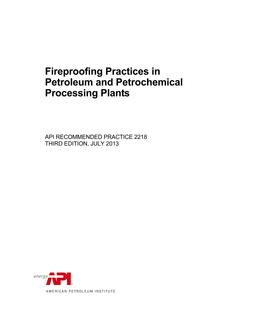Click here to purchase
This recommended practice (RP) is intended to provide guidance for selecting, applying, and maintaining fireproofing systems designed to limit the extent of fire-related property loss from pool fires in the petroleum and petrochemical industries. Where comparable hazards exist, and to the extent appropriate, it may be applied to other facilities that could experience similar severe fire exposure and potential losses.
This RP identifies fireproofing needs for petroleum and petrochemical plants specifically focusing on property loss protection for pool fires scenarios in on-shore processing plants. Only passive fireproofing systems are within the scope of this recommended practice. The following are outside the scope of this RP; however this RP contains information which may be useful in these applications:
- fireproofing for LPG storage vessels (see API 2510 and API 2510A);
- fireproofing for personnel protection;
- fireproofing for buildings.
Properly implemented fireproofing (passive fire protection) can protect against intense and prolonged heat exposure which otherwise could cause collapse of unprotected equipment, leading to the spread of burning liquids and substantial loss of property. Fireproofing may also mitigate concerns for life safety and environmental impact by reducing escalation. Fireproofing and other fire protection measures may be appropriate for fire protection where hazardous chemicals could be released with the potential for exposure of employees or persons outside the facility.
The term ?fireproofing? is widely used, although strictly speaking the term is misleading since almost nothing can be made totally safe from the effects of fire exposure for an unlimited time. In effect, fireproofing ?buys time? for implementation of other protective systems or response plans such as isolation and use of emergency isolation valve/remotely-operated shutoff valve (EIV/ROSOV), unit shutdown, deployment of fire brigades or evacuation.
This RP addresses fireproofing of structural supports in process units and supports for related equipment (such as tanks, utilities and relevant off-site facilities). Fireproofing can also be used to protect instruments, emergency shutoff valves and electrical equipment that may be used to mitigate fire.The recent revision includes the addition of a new Informative Annex C on Jet Fire Considerations. This new annex covers the science of Jet Fires and current knowledge of fighting Jet fires gained from studies conducted since the Piper Alpha incident which occurred in 1988.
Product Details
- Published:
- 07/01/2013
- Number of Pages:
- 68
- File Size:
- 1 file , 870 KB
- Redline File Size:
- 2 files , 6.1 MB
- Product Code(s):
- K22183, K22183, K22183
- Note:
- This product is unavailable in Cuba, Iran, North Korea, Syria
